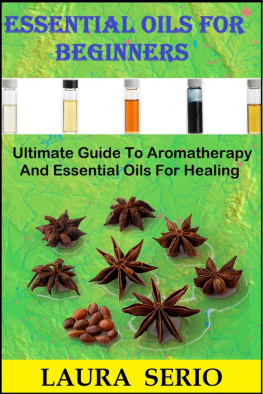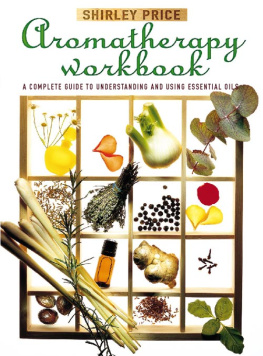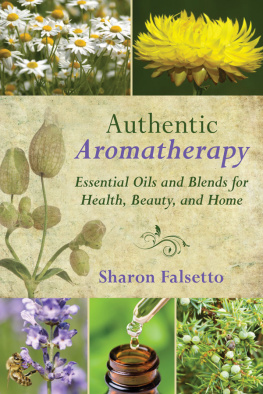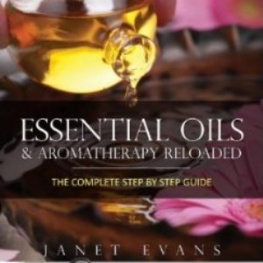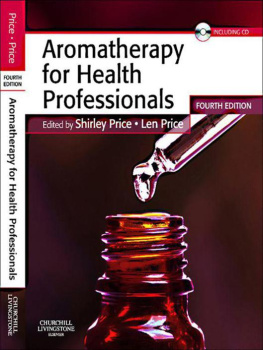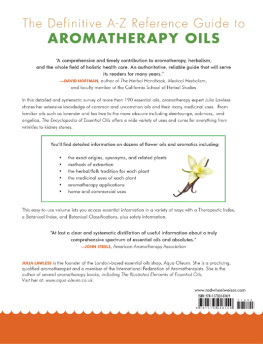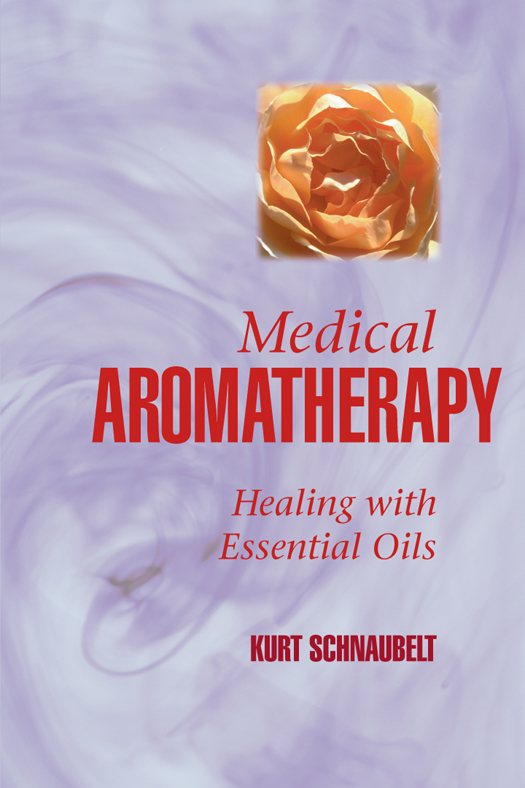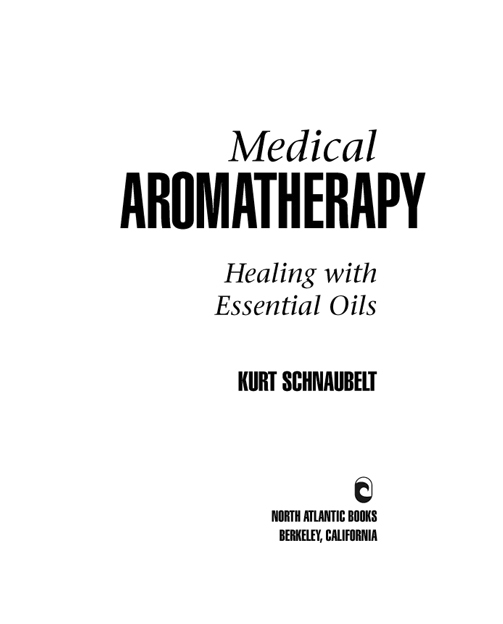Copyright 1999 by Kurt Schnaubelt. All rights reserved. No portion of this book, except for brief review, may be reproduced, stored in a retrieval system, or transmitted in any form or by any meanselectronic, mechanical, photocopying, recording, or otherwisewithout the written permission of the publisher. For information contact North Atlantic Books.
Published by
North Atlantic Books
P.O. Box 12327
Berkeley, California 94712
Cover design by Andrea DuFlon
Medical Aromatherapy: Healing with Essential Oils is sponsored by the Society for the Study of Native Arts and Sciences, a nonprofit educational corporation whose goals are to develop an educational and cross-cultural perspective linking various scientific, social, and artistic fields; to nurture a holistic view of arts, sciences, humanities, and healing; and to publish and distribute literature on the relationship of mind, body, and nature.
North Atlantic Books publications are available through most bookstores. For further information, call 800-733-3000 or visit our website at www.northatlanticbooks.com.
eISBN: 978-1-58394-808-8
The Library of Congress has cataloged the print edition as follows:
Schnaubelt, Kurt
Medical aromatherapy : healing with essential oils / Kurt Schnaubelt
p. cm.
1. Aromatherapy. 2. Medicinal plants. 3. Alternative medicine
I. Title.
RM666.A68S366 1998
615.321cd21
97-46512
v3.1
Fr Anni und Ferdinand
A Note to the Reader
The material in this book is intended to provide a review of the chemical healing properties of the essential oils of aromatherapy and the socio-cultural context in which medical aromatherapy is situated in 1998. Every effort has been made to provide accurate and reliable information. However, you should be aware that professionals in the field may have differing opinions and change is always taking place. If any of the treatments described herein are used, they should be undertaken only under the guidance of a licensed health care practioner. You and your physicians or licensed health care professional must take full responsibility for the use of the information in this book. The author, editors, and publisher cannot be held responsible for any error, omission, professional disagreement, outdated material or adverse outcomes that derive from use of any of these treatments in a program of self-care or under the care of a licensed practioner.
Contents
Introduction
A romatherapy is shamanism for everyone. A vote for aromatherapy is a vote to test reality in new ways rather than in a laboratory. With aromatherapy, individual human life plays a role; the life story of a woman or a man receives recognition and respect. The fact that aromatherapy is also a healing tool and a form of communicating with plants is simultaneously part and consequence of the above concept. Subordinating aromatherapy to what can be proven scientifically is either folly or execution of a hostile agenda. The role of science in aromatherapy is clear: it can help us understand some of the more complex mechanisms in which oils can be used to treat symptoms of diseases, but science is not equipped to explain the miracles of life to which the interaction with essential oils and plants opens a glimpse.
The total trust that is bestowed on the scientific process is the primary cause for many health problems industrialized societies encounter. Scientific process is allowed to run unchecked and the results are invariably accepted as a blessing even if a sober assessment would have to conclude that some of them are catastrophic. In the health-care sector of society, this process is completely out of control. HMOs routinely subordinate the legitimate health concerns of their customers to profit considerations while legal drugs are causing pathologies and deaths in unprecedented proportions.
All this continues because of the all-encompassing conditioning almost everyone is subjected to from cradle to grave. As children we are told to do what the doctor says, and in high school we are indoctrinated with scientific dogma. Huge institutions are based on producing and administering science, and in public discourse calling something unscientific finishes the topic, no further questions asked. Reason has long given way to suicidal commerce. To the same degree, as reason has left the conventional health-care drug business, it has become inhuman.
Healing with essential oils is different from purchasing mainstream medical services and products. It is a path away from the hubris of apparatus-medicine. It reverses the current attitudes of commerce before life and information over reason. Aromatherapy is neither destructive business nor brain-dead information management; it embraces all aspects of human life, including instinct and the human spirit. How our shift toward the exclusive dominance of science has dehumanized life in industrialized societies is summed up in a short quotation from Leandis, a Native North American: Bird has instinct. Humans have reason and instinct. We combine it and make it an emotion. Instinct serves the animal well, but to us it can get in the way, especially if we only react to emotions. The only thing that can interfere with intuition is reason. Reason was humanitys greatest blessing. But not anymore, since it has taken over intuition.
In aromatherapy the chemistry of plants is accepted as a teacher, refreshing our awareness for the wonders of creation. It reverses the sexism of the old system, it approaches health care with intermediate technologies, and to a large degree it liberates us from stifling dependence on cold experts. It returns the power to heal to the layperson. Aromatherapy is a road leading to the mastery of our own health care.
What we observe is not nature itself, but nature exposed to our method of questioning.
Werner Heisenberg
ONE
An Unclear Picture
T his book sets out to free aromatherapy from the limitations of certain current cultural norms. Aromatherapy does not need to be limited by self-serving, business-minded thinking and the widening gap between scientific reason and a vitalist worldview. Big business threatens to oppress aromatherapy. A new class of expertsaromatherapists imitating the conventional systeminsists that people are not qualified to take care of their own health. Aromatherapy might grow more rapidly than other alternative methods of healing because it is the most accessible. Aromatherapy easily combines physiological and psychological betterment and, because plants are egalitarian, it does so for poor and rich alike.
Aromatherapy has its basis in the plant organism and its constituent molecules, which possess a chemical intelligence that speaks directly to the human organism. Aromatherapy provides an entirely different outlook on treating disease than the conventional system. Whereas current medicine is highly alienating, fear-based, and believes in the separation of body and soul, aromatherapy seeks to unite body and soul, healing our whole being.
What is aromatherapy?
At the end of the twentieth century, the practice of aromatherapy appears to consist of whatever the particular practitioner or user of essential oils might make it to be. Disjointed and scattered, it is a practice without a theory. What definitions exist are massively colored by commercial interests and/or the worldview of those who originate these interests. For instance, conventional scientists who deal with aromatherapy tend to adopt apologetic behavior toward their peers for entering an area as subjective as aroma and human emotions. They correctly realize that many of the observable effects in aromatherapy are very difficult to quantify and therefore are not the stuff from which hard scientific studies are made. The scientists discomfort around the subject of aroma and emotion is reflected in the attempts to put it in its place by restrictive definitions such as such uses of aromatic substances should therefore be called perfume therapy. These attempts at defining aromatherapy are obviously driven by the scientific worldview. Commercial interest can be identified when one realizes that science routinely serves corporate interest.


